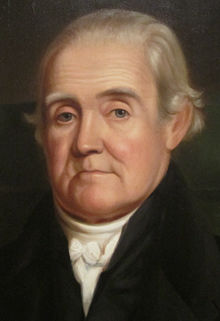Luckily I've learned to breathe deeply and ignore them.
Whose fault are the squiggles? Well, I'm not blaming Blogger, which provides a marvellously (another squiggle!) service free of charge; so I suppose I have to blame Noah Webster of dictionary fame.

portrait by James Herring
The trouble is that Webster was a man of such robust argument that he was really rather splendid. His essay at the beginning of his A Compendious Dictionary of the English Language certainly takes no prisoners, containing as it does a long and bitingly contemptuous dismissal of poor Dr Johnson's scholarship.
And then he gets on to spelling - or, as he of course calls it, orthography.
It's robustly-argued:
Strange as it may seem the fact is undeniable, that the present doctrin that no change must be made in writing words, is destroying the benefits of an alphabet, and reducing our language to the barbarism of Chinese characters insted of letters.
*
It is fortunate for the language and for those who use it, that this doctrin did not prevail in the reign of Henry the fourth; for it was as just then as it is now; and had all changes in spelling ceased at that period, what a spectacle of deformity would our language now exhibit!
*
Every man of common reading knows that a living language must necessarily suffer gradual changes in its current words, in the significations of many words, and in pronunciation.
Webster's criteria for changing spellings is not quite what you'd think:
But gradual changes to accommodate the written to the spoken language...especially when they purify words from corruptions, improve the regular analogies of a language and illustrate etymology, are not only proper, but indispensable.
Spelling reform is nowadays mostly seen as a way of improving regular analogies. Purifying words from corruptions (whatever that actually means) and illustrating etymologies (which had been a big trend in the seventeenth century and is still causing all sorts of trouble (it inserted the quite unnecessary b in the word debt, for instance) is never going to attract many supporters nowadays.
But still, although I've been left with myriads of squiggles, I can't help but admire the splendidly grumpy and arrogant Webster.
And if he wants his countrymen to write defense and color and traveling then that's fine, of course. (Americans, however, refuse to use his suggested spelling of tongue, tung. Or, indeed, doctrin.)
But color...
...as you were going to cause all this bother then perhaps he should have gone all the way to culler and had done with it.
Word To Use Today: one with an alternative transatlantic spelling. Antagonise, perhaps.
The title of this post comes from the film The Road To Morocco. 'Like Webster's dictionary we're Morocco bound.' (Morocco is a type of leather.)
No comments:
Post a Comment
All comments are very welcome, but please make them suitable for The Word Den's family audience.